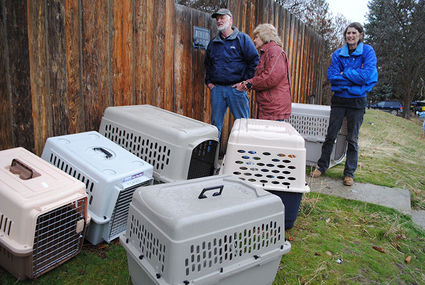Rescued dogs contract virus
TRACS says parvo prevalent in county
December 14, 2017

Justin Harris
HERE TO HELP – Last month, volunteers from TRACS rescued two dozen dogs from a residence in Hot Springs.
The old adage, "no good deed goes unpunished," rings true again – as staffers at Thompson River Animal Care Shelter found out. And the pain dished out came from an all too familiar source in the county.
Last month, TRACS rescued 23 dogs from a home in Hot Springs. And recently, three of those animals came down with the parvo virus. One puppy died from the disease, but the other two were able to be saved.
With a mortality rate of 91 percent, dogs that contract the canine parvovirus (CPV) can be saved if treated early enough, but veterinary experts and responsible dog owners know prevention is the best remedy.
"We know that parvo virus is prevalent in the county," said TRACS co-founder Wanda Thorpe, "it is passed through dog feces and can live in the soil for up to a year. Getting your dog the proper vaccinations is really the only way to prevent having to watch your pet go through a very painful death. It is heart-breaking to witness."
The Hot Springs homeowner was not able to care for the animals, and TRACS was able to get them quarantined, warm, fed and comfortable while registering each new intake and assessing their immediate health needs. While it was obvious many would need long term care, the rescuers closed out a long, rainy day of herding dogs. Concerns arose in the following days as a few puppies began to show signs of infection by the parvo virus.
When the parvo bell tolls and symptoms begin to show, it is often too late for the pup. As the virus affects the body's ability to absorb nutrients, helpless owners look on as their dog becomes dehydrated and weak from lack of protein. A lowered body temperature will usually add a constant shiver, as the virus manifests as hypothermia not a fever.
While the parvo virus survives in soil, it is also carried on the soles of shoes as humans track it around their daily lives. It is resistant to household cleaners and changes in the weather. Some dogs may not show symptoms for a while, so they may be acting as a carrier for the virus. Since it is spread through feces, the stereotypical nose-to-butt greeting by dogs can have social dogs contracting or spreading it in a hurry.
"That is why it is so important to have pets properly vaccinated," said Thorpe, noting the virus will probably never fade from the area as certain forms can be carried by fox, wolves, cats and skunks.
Puppies experience higher chances of shock and sudden death, as their immune systems are not fully developed.
The puppy lost at the no-kill local animal shelter was the only fatalities before TRACS caught on and took action, as of last week. The staffers have become very familiar (or re-acquainted, rather) with the smell of accel cleaning agent (accelerated hydrogen, one of the only known sure-fire eradicators of parvo contamination), using 48 gallons to disinfect the facility recently.
"It is just so hard to watch infected dogs suffer from something so preventable," said Thorpe. Vaccinations and health monitoring are all part of the life of a dog owner, and prevention of disease will help the dog and any untreated dogs they may come in contact with.
"It is always a big scare when parvo pops up," said Thorpe, "luckily, we were able to catch it quickly and disinfect the part of the shelter the rescued dogs were in."






Reader Comments(0)